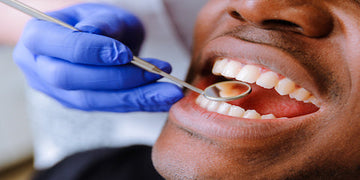by Anthony Benjamin on Oct 12, 2022

Dental Problems After Weight Loss Surgery
Over the years, as weight loss surgery becomes more prevalent, more and more individuals are claiming that they are experiencing dental problems following the procedure. Medical literature suggests that these dental problems boil down to gastrointestinal issues post weight loss surgery. These issues range from malabsorption to gastroesophageal reflex. Keep reading to learn how these conditions develop and affect your dental health.
Gastrointestinal Complications
 Bariatric surgery is no different from any
other surgery. There can be complications and some of them can damage your teeth.
Bariatric surgery is no different from any
other surgery. There can be complications and some of them can damage your teeth.
Following weight loss surgery, the most common gastrointestinal complications are gastric ulcer, stenosis of the duodenum, chronic vomiting, diarrhea, acid reflux, and dumping syndrome. Poor nutrient absorption by the stomach and intestines also increases the risk of iron, vitamin B12, vitamin D, and calcium deficiencies.
To learn more about the side effects of bariatric surgery look at our blog here!
Clinical Evidence
In one study by Heling et al., of 113 patients who received weight-loss surgery four to five years before the study, 80% of the patients visited the dentist for hypersensitivity.
The patients also produced less saliva, lowering the pH levels found in the mouth. The pH reduction can lead to or facilitate tooth demineralization (caries and erosion) and hypersensitivity.
What Is Dental Erosion?
Medical literature defines dental erosion as “the loss of tooth substance by acid exposure not involving bacteria.” Acid from different foods, drinks, and gastric acids (from vomiting and reflux) can soften tooth enamel. These acidic attacks are irreversible.
In Heling et al., 79% of the patients reported vomiting as the most frequent phenomenon following weight loss surgery. This could account for the enamel loss and, thus, hypersensitivity.
After weight loss surgery, patients are often told to eat several small meals a day rather than three larger ones because their stomachs can’t hold as much food. These foods also tend to be soft and adhere to the surface of your teeth, especially during the pureed food stage. The repeated exposure to the acids you can find in foods may also promote dental erosion.
Malabsorption
Common deficiencies following weight loss surgery include:
- Protein
- Iron
- Calcium
- Zinc
- Magnesium
- Vitamin D, B12, A, K, and C
Vitamin C is typically low in patients and can contribute to gingivitis and gingival inflammation.
Supplementation is required to ensure a bariatric patient receives enough nutrients after surgery. Malabsorption occurs because surgery alters the gastrointestinal tract. The alternations can be restrictive or malabsorptive.
When making the decision to get bariatric surgery, you are making a lifelong commitment to taking vitamins and supplements to maintain a healthy lifestyle. If you are experiencing severe dental problems, it could be possible you are experiencing a deficiency. It is important to stay in touch with your bariatric program and stay compliant with getting regular blood work.
The Importance of Calcium
One mineral that is crucial for patients following surgery is calcium. In one study, patients who underwent gastric-bypass surgery found their calcium absorption dropped from 30% to less than 10%.
Calcium is vital because it supports your skeletal structure and your teeth. It also protects your gums from inflammation and gum disease.
If you don’t get enough calcium after surgery, your body will start to take calcium from calcium deposits primarily located in your bones and teeth. Your dental health will decay as your body leeches calcium from your teeth.
Dental Wear and Anxiety
Anxiety can cause dental attrition (dental wear due to tooth-on-tooth contact). Anxiety is one of the most prevalent psychiatric disorders in pre-bariatric patients, and according to de Zuann et al., its prevalence did not change after surgery. In other words, anxiety exists in many bariatric patients pre-weight loss surgery, and it continues to persist even after weight loss surgery.
Finding a support group or being part of a bariatric community can help alleviate anxiety if you feel like you need additional help.
We like to tell patients that they have had surgery on their stomachs, not their minds/brains. The stomach will physically only hold so much food. Thus, they will lose weight. But they will still have to put in the work and support to fix the way they think and feel about food.
Check out your bariatric program and see if they offer free support groups. Or check out ProCare Health’s virtual support group held every 3rd Thursday of the month.
Dental Problems-A Review
Many different factors contribute to dental problems post-bariatric surgery. These include acid exposure, a lack of saliva, malabsorption, and anxiety. Of course, if you had dental problems before weight loss surgery, you must take extra precautions to ensure you maintain your dental health.
How To Avoid Dental Problems
Make sure to clean your teeth regularly (at least twice a day). However, you can use PH regulating mouth rinse and brush your teeth after every meal to help protect your enamel.
Semi-annual cleanings by your dentist will also help keep your teeth not only sparkling clean but healthy too. Make sure to stay in touch with your dentist so you can follow up on any issues that may arise.
You should also ensure that you are taking all the correct vitamins and minerals your body needs post-surgery. Calcium and vitamin D are particularly important, but not the only ones you need. Make sure to take a bariatric multivitamin and space out your calcium supplements by 2 hours to increase absorption. Lastly, keep scheduling and attending your blood work appointments to stay on top of any deficiencies.
Avoid Dental Problems with ProCare Health
One of the main issues that cause dental problems after weight loss surgery is malabsorption. To avoid the consequences of malabsorption, you must supplement your diet with a multivitamin, protein, calcium, and more.
ProCare Health provides high-quality supplements specifically for bariatric patients. By taking our supplements daily, you can guarantee that you will meet your nutritional needs. Visit our website today and see what we have to offer!
For more information about bariatric surgery, check out our blogs.

Can You Drink Caffeine After Bariatric Surgery?

Can You Drink Alcohol After Bariatric Surgery?

How To Find Support Post-Bariatric Surgery

